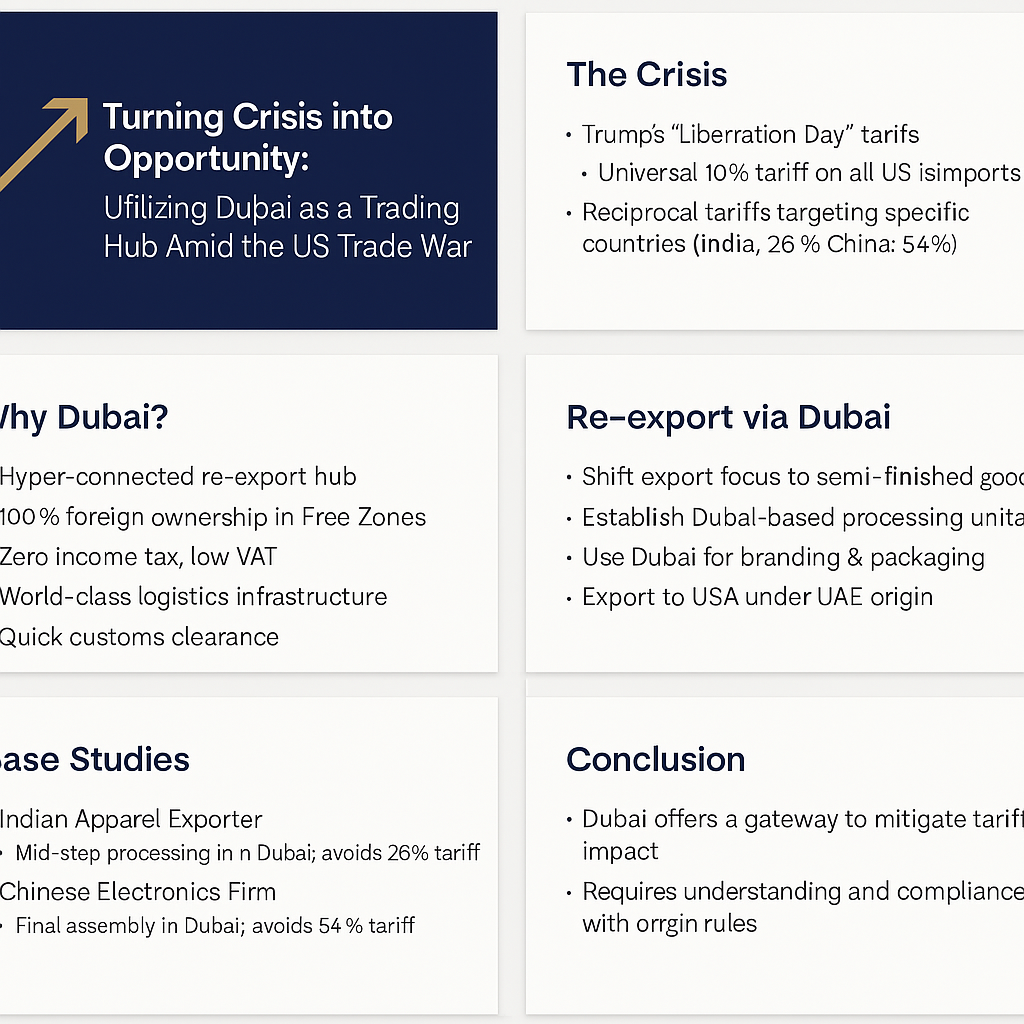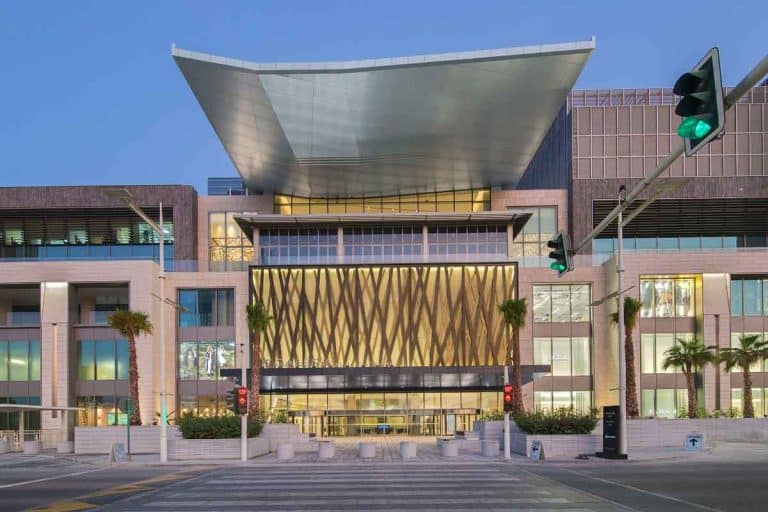
How Dubai Can Become a Golden Gateway for Indian & Chinese Exporters Amid the US Trade War
In 2020,Prime Minister Narendra Modi introduced the phrase “आपदा में अवसर”, which translates to “opportunity in disaster.” This powerful idea encourages resilience, reinvention, and strategic redirection in times of crisis. Today, as the global economy grapples with a new wave of trade protectionism — most notably U.S. President Donald Trump’s “Liberation Day” tariffs — the principle of turning adversity into opportunity has never been more relevant.
Indian and Chinese exporters are facing steep U.S. import duties, often exceeding 30–50%, under Trump’s new economic doctrine. But rather than retreating, many are looking to Dubai, a neutral, agile, and logistics-rich hub, as a launchpad to reposition their exports and sustain global growth.
The Crisis: Trump’s Tariff Bombshell
With the announcement of:
- A universal 10% tariff on all U.S. imports, and
- Reciprocal country-specific tariffs (India: 26%, China: 54%)
… exporters from Asia’s two largest manufacturing powerhouses suddenly find themselves at a disadvantage in the world’s largest consumer market.
From garments and electronics to spices and auto parts, profit margins are eroding, and price competitiveness is weakening. But in this geopolitical storm, a new channel of opportunity is emerging: Dubai.
Why Dubai? The Strategic Advantage
Dubai is not just another Middle Eastern city. It is a hyper-connected re-export hub, boasting:
- 100% foreign ownership in Free Zones
- Zero income tax and low VAT
- World-class logistics infrastructure (Jebel Ali Port, Emirates SkyCargo)
- Quick customs clearance
- Access to MENA, EU, Africa, and U.S. markets
Most importantly, Dubai is not on Trump’s tariff radar. Goods exported from Dubai to the U.S. currently face only the universal 10% tariff (if properly processed and documented as UAE-origin).

Turning Strategy Into Execution: Re-export via Dubai
Here’s how Indian or Chinese exporters can legally and efficiently leverage Dubai as a value-adding gateway:
1. Shift Export Focus to Semi-Finished Goods
Send products that are partially complete (e.g., fabric instead of shirts, raw spices instead of blends) to Dubai-based operations.
2. Establish Dubai-based Processing Units
In Free Zones like JAFZA, DAFZA, or Dubai CommerCity, set up light assembly, blending, or finishing units to:
- Transform the product
- Comply with Rules of Origin to reclassify goods as “Made in UAE”
- Avoid higher tariffs and gain U.S. customs acceptance
3. Use Dubai for Branding & Packaging
Create a global brand presence by launching Dubai-based product lines. For example:
- “Desert Spices” for Indian masalas
- “Oasis Wear” for cotton garments
- “GulfGrocers” for lentils and pulses
Dubai’s premium perception can also boost brand value in Western markets.
4. Export to USA Under UAE Origin
With the correct HTS classification, documentation, and proof of substantial transformation, goods can now enter the U.S. at just 10% tariff, bypassing country-specific penalties.
Real-World Case Studies
1. Indian Apparel Exporter
- Ships stitched-but-unfinished garments to Dubai
- Adds finishing touches (branding, buttons) in JAFZA
- Exports to U.S. under HTS 6205 — now treated as UAE origin
- Saves 26% in tariff per piece — recovers profitability
2. Chinese Electronics Firm
- Sends modules and components to Dubai for final assembly
- Completes assembly with imported batteries and chipsets
- Ships as UAE-made devices to U.S. — avoiding 54% China tariffs
Dubai as a Resilience Model
This shift isn’t just a workaround. It is a resilience strategy that:
- Decentralizes dependency on direct export lanes
- Increases regulatory flexibility
- Encourages regional value chains between Asia, the Middle East, and the West
- Protects exporters from sudden policy shocks
Key Considerations and Compliance
Exporters must:
- Understand U.S. Rules of Origin (Tariff Shift & Substantial Transformation tests)
- Maintain full documentation
- Work with customs brokers and trade lawyers
- Use digital supply chain tools for traceability
Being compliant is non-negotiable, but strategic routing is entirely legal and globally accepted — as long as rules are followed transparently.
Conclusion: From Tariff Threat to Trade Triumph
The global trading landscape is shifting rapidly. But as history shows, those who adapt — not those who resist — thrive during uncertainty.
Dubai stands today not just as a glittering city of skyscrapers, but as a safe harbor for exporters navigating the rough seas of economic nationalism and trade wars. For Indian and Chinese businesses looking for a way forward, Dubai offers the perfect embodiment of “आपदा में अवसर” — the art of turning crisis into commerce.

